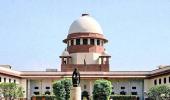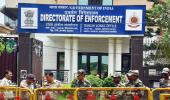The Supreme Court on Friday held that "reason to believe" for arresting a person under the Prevention of Money Laundering Act must be furnished to the arrestee to enable him to challenge his detention.

A bench of justices Sanjiv Khanna and Dipankar Datta, which granted interim bail to Delhi Chief Minister Arvind Kejriwal in the money laundering case linked to alleged excise policy scam, said section 19 of the PMLA, which gives power to arrest, puts stringent safeguards to protect life and liberty of individuals.
"We are concerned with violation of personal liberty, and the exercise of the power to arrest in accordance with law. Scrutiny of the action to arrest, whether in accordance with law, is amenable to judicial review."
"It follows that the 'reasons to believe' should be furnished to the arrestee to enable him to exercise his right to challenge the validity of arrest," the bench said in its 64-page verdict.
The bench said power to arrest under Section 19(1) is not for the purpose of investigation.
"Arrest can and should wait, and the power in terms of Section 19(1) of the PML Act can be exercised only when the material with the designated officer enables them to form an opinion, by recording reasons in writing that the arrestee is guilty," it said.
Referring to section 45 of the PMLA which deals with bail conditions, the bench said the provision gives primacy to the opinion of the Enforcement Directorate when it comes to grant of bail.
"DoE (Directorate of Enforcement) should act uniformly, consistent in conduct, confirming one rule for all," it said.
It said the in-built checks under Section 19 of the PMLA say designated officers must record "reasons to believe".
Secondly, while affecting the arrest, the reasons shall be furnished to the arrestee and lastly, a copy of the order of arrest along with the material in possession have to be forwarded to the safe custody of the adjudicating authority.
"This ensures fairness, objectivity and accountability of the designated officer while forming their opinion, regarding the involvement of the arrestee in the offence of money laundering," it said.
The bench said it would be incongruous, if not wrong, to hold that the accused can be denied and not furnished a copy of the "reasons to believe".
In reality, this would effectively prevent the accused from challenging their arrest, questioning the "reasons to believe", it said.
It, however, accepted that in a one-off case, it may not be feasible to reveal all material, including names of witnesses and details of documents for the ED, when the investigation is in progress.
"This will not be the position in most cases. DoE may claim redaction and exclusion of specific particulars and details."
"However, the onus to justify redaction would be on the DoE. The officers of the DoE are the authors of the 'reasons to believe' and can use appropriate wordings, with details of the material, as are necessary in a particular case," the bench said.
It added that as there may only be a small number of cases where redaction is justified for good cause, this reason is not a good ground to deny the accused's access to a copy of the "reasons to believe" in most cases.
"Where the non-disclosure of the 'reasons to believe' with redaction is justified and claimed, the court must be informed. The file, including the documents, must be produced before the court.
"Thereupon, the court should examine the request and if they find justification, a portion of the "reasons to believe" and the document may be withheld. This requires consideration and decision by the court. DoE is not the sole judge," it said.
Referring to the issue of judicial review to be exercised by the court while examining the arrest of a person by the ED, the bench said if adequate and due care is taken by the probe agency ensure that the "reasons to believe" justify the arrest in terms of Section 19(1) of the PMLA, the exercise of power of judicial review would not be a cause of concern.
It said doubts will only arise when the reasons recorded by the authority are not clear and lucid and, therefore, a deeper and in-depth scrutiny is required.
"Arrest, after all, cannot be made arbitrarily and on the whims and fancies of the authorities. It is to be made on the basis of the valid "reasons to believe", meeting the parameters prescribed by the law.
"In fact, not to undertake judicial scrutiny when justified and necessary would be an abdication and failure of constitutional and statutory duty placed on the court to ensure that the fundamental right to life and liberty is not violated," it said.










